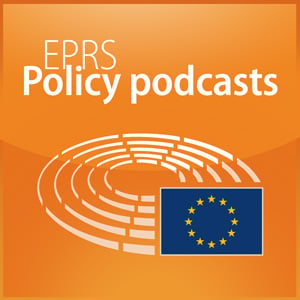Future shocks 2023: Collapse of the Internet
European Parliament - EPRS Policy podcasts
European Parliament Webmaster
4.8 • 13 Ratings
🗓️ 8 September 2023
⏱️ 9 minutes
🧾️ Download transcript
Summary
- Original publication on the EP Think Tank website
- Subscription to our RSS feed in case your have your own RSS reader
- Podcast available on Deezer, iTunes, TuneIn, Stitcher, YouTube
Source: © European Union - EP
Transcript
Click on a timestamp to play from that location
| 0:00.0 | Welcome to the European Parliamentary Research Service Podcasts. In this podcast, we'll talk about a |
| 0:07.9 | potential collapse of the internet, one of the 15 risks identified and analyzed by the EPRS in their |
| 0:14.5 | Future Shocks 2020 report. Want to know more? Stay with us. |
| 0:27.3 | The internet consists of tens of thousands of interconnected networks based on terrestrial infrastructures, intercontinental submarine cables and satellites spanning the world, and run by service |
| 0:33.6 | providers, individual companies, universities and governments. |
| 0:38.2 | Two-thirds of the world's population. That's over 5 billion people use it in their |
| 0:43.3 | personal or professional life. That is, to make bank payments, communicate with colleagues, |
| 0:48.5 | buy groceries online, even find a new partner. So, what if it fails? Well, it's something we definitely need to consider. |
| 0:56.2 | And while a total collapse is unlikely, major disruptions could occur, and this is how. |
| 1:02.5 | The internet is based on the principles of interoperability, interconnection, openness and resilience. |
| 1:09.7 | So there are risks and vulnerabilities at different |
| 1:12.7 | levels. An internet collapse may come from an unintentional technical failure at network, service or |
| 1:19.4 | application level. But it can also come from a cyber attack led by a malicious actor or government, |
| 1:25.6 | as we're seeing in the context of Russia's war in Ukraine, |
| 1:28.9 | or result from a physical attack damaging telecommunication lines or critical energy infrastructure. |
| 1:34.8 | And we shouldn't forget about the risks of espionage and foreign state interference |
| 1:39.5 | created by technological dependency on equipment and infrastructures provided by non-European companies and agents. |
| 1:48.0 | The vulnerabilities of internet infrastructure increasingly relate to the different ways the technical architecture of the internet evolves. |
| 1:56.0 | The global internet is increasingly morphing in different cyberspaces because of technological, |
| 2:02.3 | commercial and political factors, and there are growing concerns about potential fragmentation |
| 2:07.3 | into a multitude of non-interoperable and disconnected splinternets using different internet standards |
| 2:14.5 | and protocols. |
... |
Please login to see the full transcript.
Disclaimer: The podcast and artwork embedded on this page are from European Parliament Webmaster, and are the property of its owner and not affiliated with or endorsed by Tapesearch.
Generated transcripts are the property of European Parliament Webmaster and are distributed freely under the Fair Use doctrine. Transcripts generated by Tapesearch are not guaranteed to be accurate.
Copyright © Tapesearch 2025.

